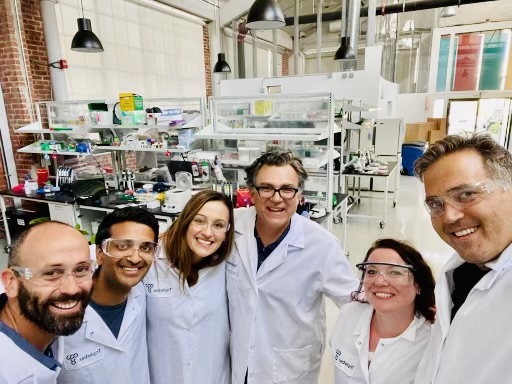Emeryville, CA-based biotech startup Triplebar has raised $20m in a funding round led by Synthesis Capital to expand its tech platform for optimizing biomanufacturing.
The round, which takes the firm’s cumulative funding up to $25 million, was supported by Essential Capital, Stray Dog Capital, iSelect Fund, and existing investor The Production Board.
Founded in 2019 by biochemist Dr Jeremy Agresti, Triplebar has developed a ‘hyper-throughput’ screening platform deploying microfluidics and rapid testing. This is coupled with AI and machine learning to develop more efficient biomanufacturing platforms utilizing microbial or animal cells.
These can be optimized to produce everything from “low-cost, low-footprint animal proteins to replace traditional animal sources” to superior cell lines for cultivated meat products and novel therapeutic biologic drug candidates.
‘A microprocessor for biology’
While scores of companies now use synthetic biology to program microbes to produce everything from dairy proteins to sweeteners via precision fermentation, the unit economics are challenging if strains are not optimized for productivity, titer, and yield, TripleBar CEO Maria Cho told AgFunderNews.
According to Cho, Triplebar’s system enables it to screen millions of mutations and optimize a yeast strain, for example, over many generations at record speed, effectively “running evolution at hyper-speed.”
She added: “Our expertise enables the product and process discovery to scale at orders of magnitude, faster and cheaper than any other company that’s out there. We take a hypothesis-free approach and say what’s the phenotype, the output of the thing that we’re looking for? And then Triplebar technology enables us to see how biology did it.”
Triplebar’s screening platform acts as a “microprocessor for biology,” integrating hardware, software, biology and biochemistry to miniaturize and accelerate evolution, explained Cho.
“Essentially we take a test tube and miniaturize it into a microreactor. We create tens of millions of yeast strains [for example], encapsulate them in our microreactors and add test reagents. And then we take tens of millions of microreactors and put them on a chip that fits in the palm of your hand.
“We then take that chip and run it on our benchtop system looking at thousands of tests per second. This is three to four orders of magnitude faster than what is currently found in terms of throughput and it allows us to determine what is the genetic profile of that organism that is creating that end product phenotype that we’re interested in?”
Collaboration model to get products to market more rapidly
She added: “We’re getting a ton of inbound inquiries. I think in the food space in particular there’s definitely been a shift towards collaboration and partnerships to try and get products to market faster. I think there’s less of that ‘not invented here’ syndrome.”
In some cases, a company will approach Triplebar with a target bioactive in mind, and Triplebar can help develop a host microorganism or animal cell optimized to produce it. In other cases, companies may already have a production strain in place, but it needs further optimizing, she said.
While standard liquid handling robotic technology can enable high-throughput screening of samples, Triplebar can assess “orders of magnitude” more, claimed Cho, noting that if you want to assess the impact of a genomic edit “at every possible position” in a given organism, the number of potential tests is enormous.
In the case of animal cells, “which like to grow in animals, not in tanks,” she noted, “We have to evolve those cells to have the properties needed to grow in tanks at cost points that could allow them to be broadly marketed, so that might mean increasing cell density, or getting them to grow in suspension [rather than having to adhere to something].”
The capital injection will allow Triplebar to take on more partnerships, said Cho, who said commercial models will vary depending on the partner.
Commercial partnerships
Triplebar’s partners include FrieslandCampina Ingredients, which is looking to scale up production of bioactive dairy proteins using precision fermentation; and Umami Bioworks, which is developing optimized cell lines suitable for large-scale cultivated seafood production, starting with Japanese eel.
Umami Meats will test “millions of potential phenotypic solutions in the time it normally takes to search mere hundreds” to accelerate cell line development and optimization without the need for genetic modification, said Cho.
FrieslandCampina Ingredients – which has been using precision fermentation since 2016 to produce human milk oligosaccharides (HMOs) – currently sells a range of ingredients targeting early life nutrition, cell nutrition, active nutrition, medical nutrition and performance nutrition, from galacto-oligosaccharides (prebiotics), MFGM and lactoferrin to plant proteins. It has not yet disclosed which ingredients it is working on with Triplebar.





